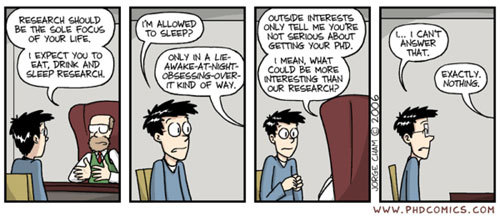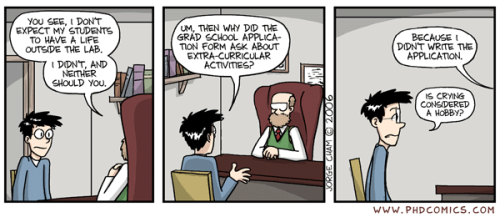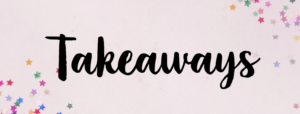Most graduate students learn how to condense their dissertation projects into a one sentence “elevator pitch” when someone asks us, “So, what do you study?”
We are also just as likely to field the question “Why do you work so much?” with a rehearsed answer. My own answer goes like this: “That’s how grad school works: the culture is such that your work is literally never done. Even if you finish your coursework and grading, you could always be doing more: research, writing articles, or applying for conferences/fellowships.” And that’s not to mention working extra jobs to earn money on top of a teaching stipend (especially if you have goals to pay off consumer debt and visit doctors and healers, like me). We are constantly reminded that “the market isn’t great,” and so we translate this into the belief that you only get ahead as a graduate student if you self-motivate to do independent work on top of that required by your graduate program. And what is worst of all is that this attitude is normalized, rewarded, and rarely acknowledged out loud.
Take for example these two comics by Jorge Cham, creator of PhD Comics:


We might laugh at these comics because they seem bombastic, but in her article for The Atlantic, aptly titled “Why Do So Many Graduate Students Quit?,” Te-Erika Patterson states, “[M]any students enter their doctoral programs assuming that they’re always expected to maintain the illusion of mental stability and confidence while interacting with faculty members, peers, or future employers—regardless of any issues that may arise. While colleges and universities are expanding mental-health services for students, many doctoral candidates feel they need to mask their weaknesses because asking for help would be detrimental to their professional reputations.”
Here’s a real life example that proves this point. When my article was published in the Journal of Lesbian Studies and I received a research fellowship to visit the ONE Archives, my graduate program publicly celebrated my accomplishments by shouting me out in our list-serv and on our department website. But when I disclosed to someone in an advisory role that I was struggling with mental health and financial scarcity, I was advised in a “you kids these days” tone to get a roommate and stop spending so much money at restaurants. As you can see, I was rewarded for accomplishing goals beyond my required graduate studies, but encountered what felt like judgment when I disclosed my struggle with mental health and money. Around the same time as I experienced that shame, a visiting scholar told our graduate class that, by his estimates, only 25% of graduate students actually finish their degree program. My colleagues and I flashed glances that uncomfortably melded the panic of “I have to be one of the 25%” and the exhaustion of “I completely get why 75% of people drop out.”
I imagine my graduate student readers are nodding their heads right now. We know this culture of non-stop work is not healthy, but we don’t know other options. While I don’t think one blog post can shift the entire systemic issue at hand, I do want to acknowledge my own workaholic tendancies as a graduate student and provide readers (grad students and non-grad students alike) with suggestions for how you can bring more awareness to your work habits.
Workaholism is Sneaky
I am a professional at rationalizing my work (both scholarly and “money jobs”) binges. When I say out loud “Things are super busy right now, but it’ll calm down before I know it!” I am usually thinking “If I drop the ball at work, by boss might not renew my contract” and “whether or not I am exhausted/overworked/in pain does not affect the fact that my quality of work should be perfect. If I do not exceed or at least meet expectations, someone else will come along and exceed them in my place.” In the past, when I attempted to be more efficient at setting goals I fell prey to putting healing on the back burner in my efforts to be as productive as possible. Now, part of this truly was because of timing: my jobs have particular deadlines that fall in early summer, I was prepping for a conference presentation in Minneapolis, and I was doing an overhaul revision of my dissertation prospectus. But as my posts on perfectionism & pain and negative self talk say: I sacrificed my physical and mental health in my quest for perfection.
This isn’t to say that I don’t LOVE my research, teaching, and the cool things I get to do at my side job 1 and side job 2, because I do. I’m a researcher at heart, which should be evidenced by the ways that I write this blog and talk up Gretchen Rubin. But, the ways I have been working are not sustainable.
I knew that I needed to examine my tendencies to work myself into the ground when I was doing homework for Kate Snowise’s Channel Your Chill course and I couldn’t think of anything to say to answer her question, “What do I enjoy doing for the sake of it?” I could think of social things that light me up, like cooking with my Sweetie, talking on the phone with my best friend who lives on the east coast, and once a week friend dates with my best friend who lives on the east coast. In terms of solo activities, though, I didn’t feel like I was really enjoying anything for the sake of it. I view my self care practices as transactional: because I work so hard, I will literally break down if I don’t force myself to take self care breaks, so I take baths and read YA fiction at night per the suggestion of my therapist, who said it might help with healing. When I walk in nature, I rationalize it with “Okay, if I do this I can skip the gym” or “I can listen to this podcast while I run errands.” I have come to despise wasted time, and although I talk the talk of regularly practicing meditation and gratitude, over the last month I have only resorted to them when I was about to crack. Last weekend in my hotel room after I had presented my conference paper and had hours of free time to relax, I felt so incredibly uncomfortable that I came up with work to do to keep myself busy until bedtime.
It should come as no surprise that I was intrigued with the concept of workaholism.
What is Workaholism?
Lost Control
First of all, did you know that Alanis Morrissette has a self development interview podcast called “Conversations with Alanis Morrissette”?! Well, she does, and her Episode 13 interview with Bryan E. Robinson about work addiction is essential listening. Robinson is a self admitted workaholic (as is Alanis), and he has published widely on the topic. In Chained to the Desk: A Guidebook for Workaholics, Their Partners and Children, and the Clinicians Who Treat Them, Robinson defines workaholism as “an obsessive-compulsive disorder that manifests itself through self-imposed demands, an inability to regulate work habits, and overindulgence in work to the exclusion of most other life activities” (3). Now, let’s apply these concepts to the graduate school work culture I mentioned at the beginning of the post: first, our work is often self-motivated, as we are encouraged to publish, present on, and further our research independently; second, it can be difficult to regulate work habits when responsibilities and deadlines shift in terms of grading, applying for external opportunities, or developing our own projects; finally, and this is especially for those of us who work extra jobs or who are dealing with doctor’s appointments (and, while it’s not my experience, those who are caretakers or parents), we usually have to work in the evenings or weekends to get ahead. I’m sure that Robinson’s methods for recovering from workaholism may help me to have different attitudes and approaches to those three things, but from where I stand, I don’t see how most graduate students can not be workaholics. And, as I mentioned above, we may not feel that we have any control over the situation except to control our productivity.
Do-aholism
In episode 59 of the podcast The Naked Mind, Annie Grace interviews Dawn Nickel (creator of She Recovers) about Workaholism. Dawn and Annie both are recovering from substance addiction, and the connection between substance and work addiction was fascinating! One key takeaway was that Dawn said it should be called “do-aholism” instead of “workaholism,” because we get obsessed with DOING things, not just working. I really resonated with this, because often my 12-hour days are not all composed with sitting or standing at a desk, I might be running from job 1 to job 2 to physical therapy to other doctor’s appointments to meet with my dissertation chair to buy cat food to round up my night working on work for job 1 or 2 or my prospectus until it’s time to force myself into the bath at 9pm. In an ideal world I also fit the gym and socializing in there, but what I lack is down time.
Obsession
I resonated with another podcast episode, HappyMelly’s interview with Tomas Kejzlar about Combatting Burnout and Workaholism. Kejzlar notes that workaholism is not something that hits us out of the blue; it’s something we slowly build up. He mentions how he used to check and respond to work emails at midnight and on vacations, even though he told his colleagues that they should not be overworking themselves. He also admits that he hit a point before where his work was negatively affected because he was so burnt out from working all the time and constantly thinking about work while he was outside of work.
Similarly, in his interview with Morrissette, Robinson admitted that he literally had snuck his work on a vacation by hiding it in his car and then worked on it secretly after he lied to his family that he was going to take a nap. When we become addicted to working, we tend to prioritize it over taking care of our health and our relationships.
What I’m Doing About it
I definitely think that if I am not a workaholic that I at least exhibit workaholic tendencies and they do not serve my healing or tending. As I’ve mentioned before I personally am not interested in working through 12-Step programs, but I am inspired by their literature and language, so I am going to give some of Robinson’s work a try and peruse the literature at the Workaholics Anonymous webpage.
Adjust My Perspective on What is “Good Enough”
After a week of working very hard, I knew I didn’t want to run myself into the ground at the conference last weekend. There were so many delicious panels to go to and so many people to network with, so I struggled not to feel guilty for taking breaks. But I gave myself permission to attend just one panel a day and network with one person a day, and I hit those goals.
Permission to Relax
My reiki practitioner, Anna Joy, encouraged me to write an affirmation to encourage myself to prioritize self care. I came up with this, which I am telling myself every day: “I give myself permission to see taking care of myself as productive.” Some people may prefer to separate the concept of productivity from self care, but it works for me (at least right now) to connect them.
Creating Without an End Goal
Ideally, I would also like to lean into creation without focusing on generating a product. I love to do paper crafts and embroider, but I haven’t done either in a looooong time. Brooke and Ben McAlary of the Slow Your Home podcast did an amazing month-long “Daily Creativity” experiment where they reminded listeners that creativity doesn’t have to mean that you paint a beautiful painting or write a novel. What matters is that you’re defining creativity for you, and for me this might include writing out mantras and decorating them.

If you suspect you might be a workaholic or have workaholic tendencies, I don’t expect you to feel like you absolutely must join Workaholics Anonymous or quit a job or force a meditation practice. All I want you to do right now is be curious about whether your work habits feel healthy and think about how you might want to shift them. I’ll give you more practical exercises to do the shifting part throughout June, but right now, just focus on learning about yourself.
Check out These Lists
Try taking Robinson’s 25-question “Are You a Workaholic?” quiz (you don’t have to give your email or sign up for anything to take the quiz)
See if you resonate with the Twenty Questions that Workaholics Anonymous says might indicate workaholism.
And, finally, Dutch PhD Coach Arjenne Louter’s checklist about how often you do certain work practices, which can help you to identify whether or not you are overworking.
*Please note that the original version of this blog post was published here.
newsletter and free resources
Sign up below to access six free resources and my newsletter, tending.

